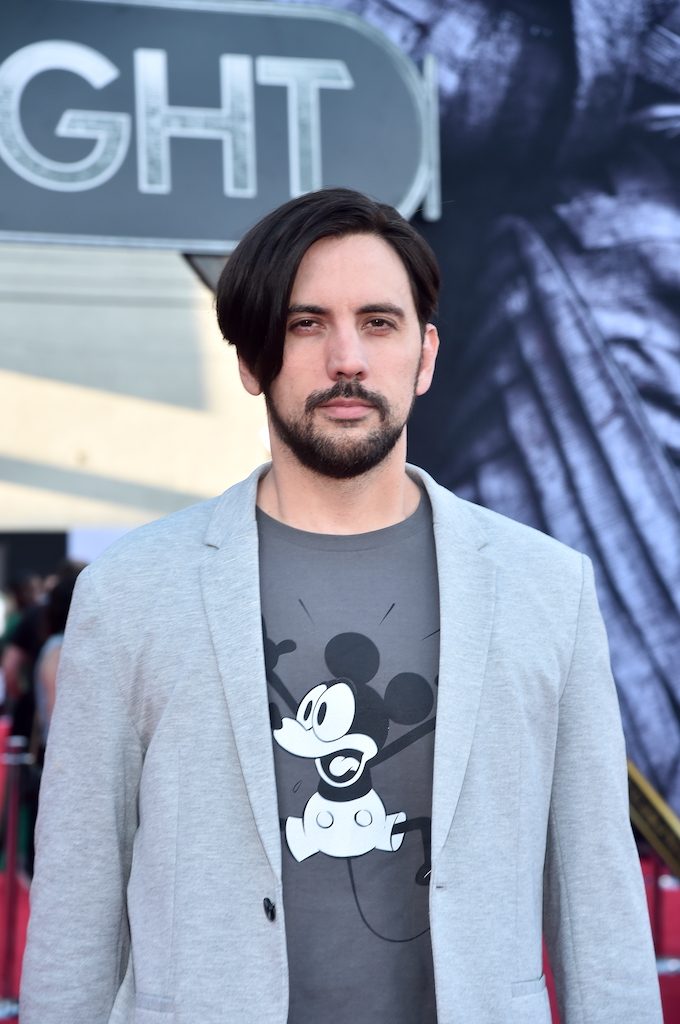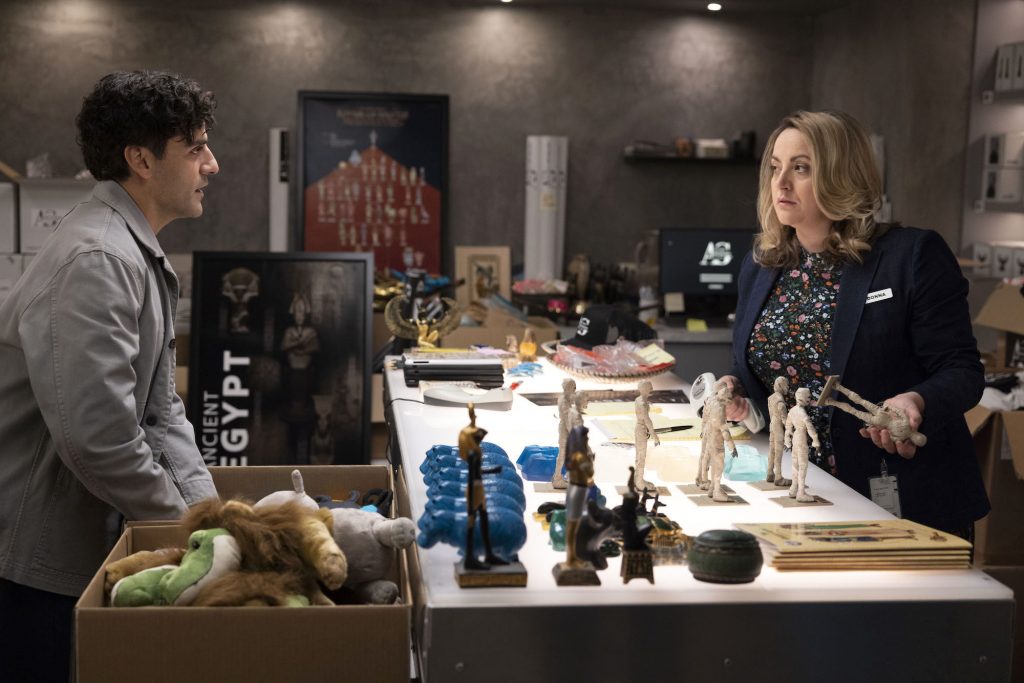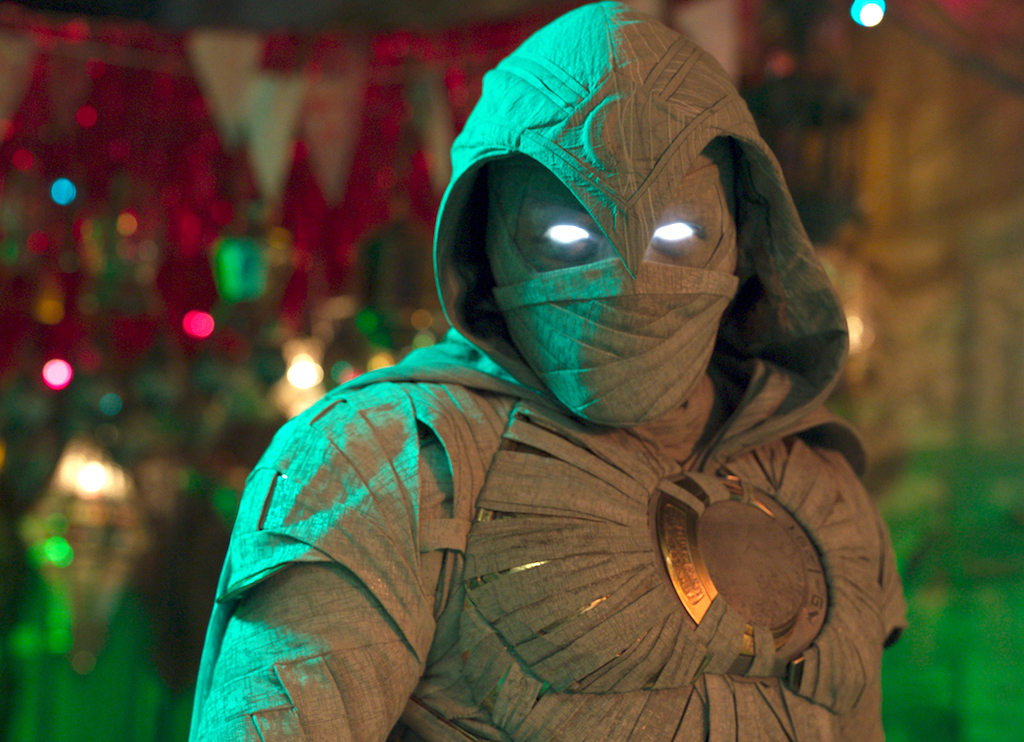“The answer always goes back to Jaws,” said Jeremy Slater, when asked about why he got into the business in the first place. “It was the movie I saw far too young. It’s still my all-time favorite movie. I saw it at a very young and it scarred me and traumatized me. I had a negligent babysitter and I was young enough I thought any water source was a potential shark lair,” he joked. “My parents had to explain what movies were.”
After this explanation, Slater said he was no longer interested in being an astronaut or police man. Instead, like Steven Spielberg, he wanted to “grow up and play with giant, rubber sharks.” Slater’s rubber sharks came in the form of The Exorcist, The Umbrella Academy, Fantastic Four, and most recently, Marvel’s Moon Knight series for Disney Plus.
In his latest project, a six-episode series starring Oscar Isaac and Ethan Hawke, “Steven Grant discovers he’s been granted the powers of an Egyptian moon god. But he soon finds out that these newfound powers can be both a blessing and a curse to his troubled life.”
Intellectual Property
“Right now, IP sort of rules this town,” said Slater. “I’m currently trying to get funding for a spec script I wrote last year, for me to direct, that’s not based on IP and it’s such an uphill challenge.” On the other side of this, the screenwriter acknowledges the many lanes there now are to get projects made. “The advantage is that there are so many new homes for content and there’s a race for content. It’s easy to take IP and use it to tell interesting, exciting stories to tell interesting stories you already wanted to tell.”

Jeremy Slater. Photo by Alberto E. Rodriguez/ Getty Images for Disney Studios
For Moon Knight, as an example, the creators wanted to use the Marvel vehicle to talk about mental illness, something they’ve never really done before to this extent. Other IP projects come from Saturday morning cartoons, but there’s always room for art. “Some of these things shouldn’t work, but artists find ways to smuggle really exciting ideas under the guise of selling toy kits for a company.” The LEGO Movie is one specific example he enjoyed.
For Slater’s spec, he focused on writing it at a “reasonable cost.” He’s working with James Wan and Michael Clear from Atomic Monster (Malignant, Mortal Kombat) and they found a “comfortable budget” around $10-12 Million.
“It’s a monster movie with creature work and some big special effects, so the challenge is how much fun stuff can you shave away without taking away the reason you’re making it in the first place. I think we found some smart compromises. Writing for a budget is very different than writing for Marvel.”
Television vs. Movies
Slater said the old trope that writers have more freedom in television than movies is only true depending on the budget of the project. For massive Marvel jobs, there’s always a studio steering the ship.
“Anytime you are making something on a large scale — Marvel, Game of Thrones, Stranger Things — I think it’s a much more traditional Hollywood structure with the director calling the shots, unless you have a superstar show runner like Vince Gilligan or The Duffer Brothers calling the shots.”
He continued, “But I think you can be in charge up to a certain budgetary mark and once you go past that mark, everybody is a little more nervous and they want an experienced feature director who has $100 million dollar successes under the belt.” Slater said television itself is in an unusual area of “growing pains.” Shows like Stranger Things might have a $300 million dollar budget, but then there are much cheaper shows like The Dropout or Dopesick.
As for Moon Knight, it leans towards the larger budget based on Disney and Marvel. Slater got involved with the project by being a fan of the comic and then working a decade to get into the “Marvel Camp.”
Writing Moon Knight
Hot off The Exorcist and Umbrella Academy, Slater got a meeting with Marvel and saw their list of potential projects. “They had a list of characters they were thinking about developing shows for and one of them was Moon Knight.”

Marc Spector (Oscar Isaac) and Donna (Lucy Thackeray) Photo courtesy of Disney Studios
Slater saw Moon Knight as a “show nestled in the horror corners of the MCU.” He continued, “It was a very long process. It took several months to figure out what Marvel was creatively excited by and figuring out a pitch that everyone loved. It took four months before I knew I had the job.”
To elaborate on the horror corners of Marvel, Slater said all Marvel movies and shows somewhat have a genre element built in. Venom is Marvel’s horror franchise. Guardians of the Galaxy is Marvel’s sci-fi franchise.
“Kevin Feige, (President of Marvel Studios) is hyper aware of not repeating past successes. His experience, coming up through the X-Men and Spider-Man movies, he saw what worked and what didn’t work. The thing that keeps a comic universe from being stagnant is always surprising the audience and pushing those boundaries.”
They didn’t care to simply make Moon Knight another superhero origin show. “They were never interested in that. It was always about what we haven’t seen before in the Marvel universe. For Feige, those elements were the Egyptology and the mental health struggles.”
In the story, the Moon Knight’s (Oscar Isaac) enemy isn’t actually Arthur Harrow (Ethan Hawke), but “his own mind.”
Dark Places
“It was a big question in our writer’s room,” said Slater when thinking about who the show was for. “There’s always a question of how far can we go? Can we kill people on screen? That’s something you see in DC, but the heroes in Marvel don’t kill.”
The writers found a middle ground with the “Hard PG-13” arena. “If you stay within those parameters, we can protect you, especially in terms of telling an adult story, making this emotional complex, and having a story that goes to some dark places involving trauma and child abuse.”
Slater said they never had a conversation after that about what was or was not appropriate. Kevin Feige told the team, “If you go too far, I’ll pull you back. You don’t have to worry about that. So we relied on him to keep us on track.”
Within this lane from Feige, Slater found his version of the story thinking about specific “moments” that could make the complex tale entertaining on the small screen. “I don’t know why the person is in this bathroom. I don’t know why there’s a person being chased by a monster, but I know suddenly his reflection turns to him and says, ‘I can save you but you have to give me the body.’”
This vision came to Slater and it eventually formed the end of the pilot episode. “I got that idea in my brainstorming phase and knew it was the end of the first episode. Then I worked forward and backwards.”
Collaborative Environments
For Moon Knight, the initial pitch was a simply hypothetical series structure from Slater. “The first episode was pretty close. It had the same Raiders of the Lost Ark car chase and the guy chaining himself to the bed and being chased by the monster. But episodes 2-6 basically got thrown out.”
Part of the reason for the rewrites is that you’re pitching to Marvel “in a vacuum.” Meaning, if one idea is too similar to another project, something has to be changed. “Once you get in the weeds, you realize this villain doesn’t work because it’s on the heels of another project.”
Slater pitched for four months. Then, they had a writer’s room for 24 weeks. They worked on the first two versions of the show. After that, Slater was responsible for additional rewrites, which spread out across another eight months. “I think all together, I probably wrote between 1,200 and 1,500 pages of material.”
“We did six versions of the show and each version was about 360 pages long,” he added. “It was intense.” That happened to also coincide with the pandemic, so writing about mental health during the pandemic was difficult to say the least. “It was a very taxing, exhausting time.” That said, each rewrite changed in a very significant way, so each new version felt like an entirely new show.
“It’s hard work, but that’s the price you pay for writing on a stage this big. You don’t question whether it’s getting made. You know win or lose, you’re going to have millions of eyes on this, so you better get it right. That enthusiasm/terror lights the fire to keep you going.”
Aside from work ethic, Slater advises writers to find the balance between “something that reads well on the page versus something that reads well when spoken aloud. Those things aren’t always the same. It might feel natural on screen but look unprofessional on the page. Finding that balance where you’re writing lives between those two areas and it reads real enough that an actor can ground it but it reads well enough that it’s not going to get noted to death and die in the development phase.”
This interview has been condensed. Listen to the full audio version here.

